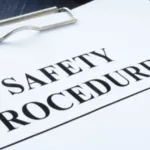NFPA 70E is a standard developed by the National Fire Protection Association (NFPA), focusing on workplace electrical safety. It provides guidelines for establishing safety practices to protect employees from electrical hazards. NFPA 70E provides a comprehensive approach to electrical safety in the workplace and covers various aspects, including risk assessment, safe work practices, maintenance procedures, and personal protective equipment. The National Fire Protection Association (NFPA) 70E focuses on preventing electrical injuries and fatalities and is widely recognized and adopted in many industries. NFPA 70E compliance saves lives, reduces injuries, and can help avoid lost production and fines.
NFPA 70E safety training is designed to educate workers and employers about electrical safety practices, risk assessment, and proper use of personal protective equipment (PPE) when working with or around electrical systems. The training is crucial to anyone who works with or near electrical equipment, including electricians, maintenance personnel, engineers, project managers, and supervisors.
During NFPA 70E safety training, participants can expect to learn about the following key topics:
- Electrical hazards: Understanding the various types of electrical hazards, including shock, arc flash, and arc blast, and their potential risks to individuals and equipment.
- Safety procedures and practices: Learning safe work practices, including lockout/tagout procedures, de-energization, and establishing an electrically safe work condition (ESWC).
- Risk assessment: Conducting a thorough assessment of potential electrical hazards in the workplace, identifying hazards, and implementing the necessary hierarchy of control methods.
- Personal protective equipment (PPE): Understanding the importance of PPE, such as arc-rated clothing, gloves, face shields, and hearing protection, and learning how to select, use and maintain them properly.
- Arc flash: Learning that arc flash is a sudden release of electrical energy through the air when a high-voltage electrical fault or short circuit occurs. It is accompanied by intense light and heat, producing an arc that can reach extremely high temperatures. Arc flash incidents can cause severe injuries, including burns, hearing loss, and eye injuries due to the thermal energy released by the arc. The heat generated can ignite nearby flammable materials and cause explosions.
- Arc blast: Understanding the concept of arc blast, including the factors that contribute to their occurrence, their potential hazards, and methods to minimize their effects. Arc blast is the pressure wave or blast created by an arc flash incident. An arc blast can propel debris, molten metal droplets, and hot gases at high velocities, posing additional hazards to individuals near the arc. Arc blast incidents can cause severe injuries due to the physical force of the blast, including blunt trauma, concussions, and even fatalities. The blast can also cause structural damage to equipment and surrounding infrastructure.
- Electrical equipment maintenance: Learning about the importance of proper maintenance procedures for electrical equipment to ensure safe and reliable operation.
Complying with the NFPA 70E standard is imperative to avoid injury or death by electrical shock. Employers have a significant responsibility for ensuring electrical safety in the workplace. NFPA 70E was first developed at OSHA’s request and can help companies comply with OSHA standards. OSHA has specific regulations related to electrical safety, which are outlined in its general industry standard 29 CFR 1910 Subpart S and construction industry standard 29 CFR 1926 Subpart K. These regulations cover a wide range of electrical safety topics, including equipment use, wiring standards, lockout/tagout procedures, and training requirements.
Proper precautions and safety measures are essential to prevent accidents and ensure the well-being of workers. Employers must comply with all relevant electrical safety regulations set forth by OSHA and are responsible for maintaining the electrical systems in the workplace. Employers must provide proper training and education to employees who work with or near electrical systems. Employers must be aware of the potential dangers associated with electricity and know how to mitigate those risks. Employers must also provide personal protective equipment and have procedures in place for responding to electrical emergencies, such as electrical shocks, fires, or equipment failures. This includes providing accessible fire extinguishers, emergency shutdown procedures, and training employees on emergency response protocols. To protect against arc flash and arc blast hazards, it is crucial to maintain adequate distances from energized equipment, implement engineering controls, and use appropriate protective measures such as arc-rated clothing, face shields, and helmets as the last line of defense. Employers must establish a system for reporting electrical incidents and near misses. Accurate inspections, testing, maintenance, and employee training records must also be maintained. By fulfilling these responsibilities, employers can create a safe working environment that reduces the risk of electrical accidents, protects employees’ well-being, and ensures compliance with regulations. Compliance with NFPA 70E is considered a best practice and helps organizations demonstrate their commitment to electrical safety.
If you are ready to get started with NFPA 70E training, contact us today at 919-417-2139 or . Employers and workers must familiarize themselves with both OSHA regulations and NFPA 70E standards to ensure a safe working environment and compliance with applicable requirements. Electrical injuries often involve violations of the NFPA 70E requirements and inadequate electrical safety work practices. Your employees will benefit from NFPA 70E training, which will help create a safer workplace with fewer accidents. If you have questions, please contact us. We would be happy to discuss NFPA 70E safety training in more detail and how NFPA 70E relates to your workplace.


